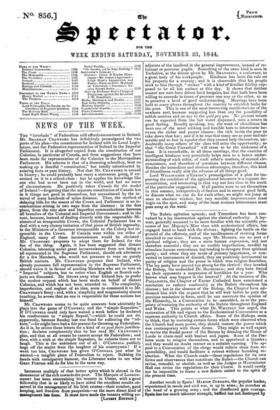The Rubric agitation spreads; and Tottenham has been con- vulsed
by a lay insurrection against the clerical authority. A lay- man, generally assumed to be more familiar with the scientific pro- cesses of her Majesty's Mint than with ecclesiastical affairs, has engaged hand to hand with the divines ; fighting the battle on the ground of the offertory, and of the needlessness of reviving forms unsuited to our time. Forms, says Mr. Musner, are no part o f spiritual religion ; they are a mere human expression, and not therefore essential; they are an earthly imperfection, needful to stimulate human earnestness, but tending to derogate from spiritual purity ; and when they are made of primary importance, or con- verted to instruments of discord, they are positively detrimental to purity of religion and the peace in which true religion flourishes. The lay party have proved too strong for the clerical : they invaded the Bishop, the undecided Dr. BLOMFIELD ; and they have forced on their opponents a suspension of hostilities for a year. Who knows what may happen in the interval ? At the instance of Dr. PHILLPOTTS, the Chapter of Exeter Cathedral have sanctioned a resolution to enforce conformity to the Rubric throughout his diocese ; but in the absence of the Bishop, the Chapter have ad- dressed him with the request that he will wait before he puts the previous resolution in force, until he can ascertain the opinion of the Hierarchy, in a Convocation to be assembled, as to the pro- priety of restoring the authority of the Rubric throughout England and Wales. This points at what Dr. Wnermar has urged, the restoration of life and vigour to the Ecclesiastical Convocation as a supreme authority in Church affairs. Some of the Bishops seem to think, that by restoring certain forms which were observed when the Church had more power, they should restore the power which was contemporary with those forms. They might as well expect to revive the feudal power of the Barons by dressing the House of Lords in chain-mail with basinet and jupon. Some of the Pre- lates seem to misgive themselves, and to apprehend a blunder ; and they would no doubt retract on a suitable opening. The ap- peal to a Convocation of the clergy would relieve them from re- sponsibility, and would facilitate a retreat without humbling re- traction. What the Church made—those regulations for its own forms and observances that constitute the Rubric—the Church can revise, remodel, or abolish, as well as the Judges at Westminster Hall can revise the regulations for their Courts. It would surely not be impossible to frame a new Rubric suited to the spirit of the present time.


























